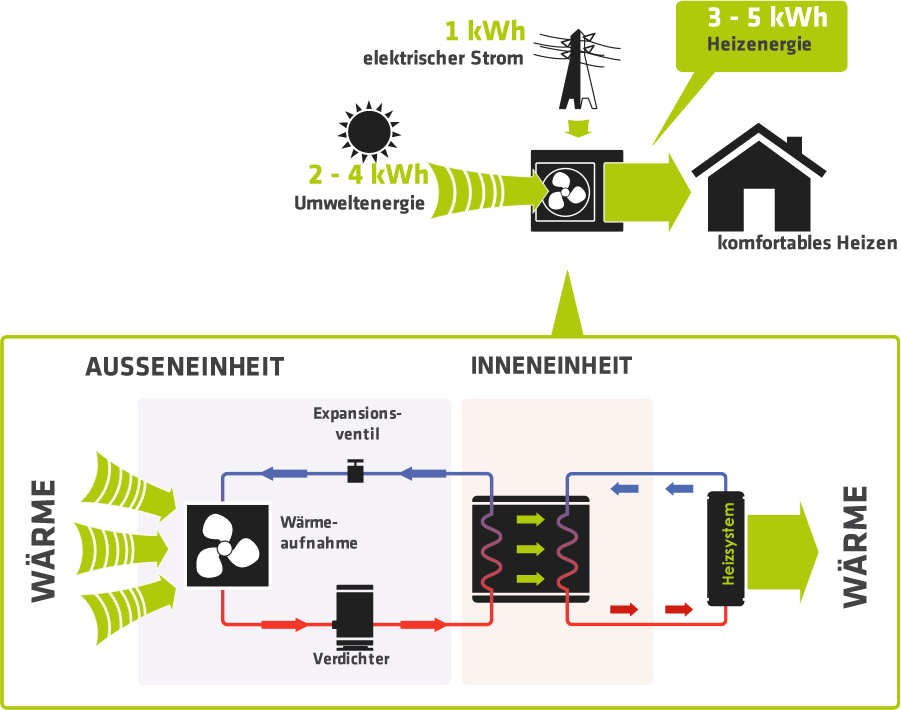In 2016, only a maximum of 75% of the primary energy permitted in the previous year may be consumed. In this context, heat pumps have already proven to be a very efficient alternative for heat generation. This article offers you expert answers to five essential questions about heat pumps.
the essentials in brief
- Heat pumps use the natural warmth of their surroundings for the heating energy to be produced in the house, which makes them particularly environmentally friendly.
- A heat pump produces about four times as much energy as it needs. As a result, they are not only energy-efficient, but also very cost-saving in the long term due to their independence from fossil fuels.
- In combination with other alternative energy concepts, such as photovoltaic systems, the required primary energy can be reduced to a minimum.
How do heat pumps work?
In principle, a heat pump works in a similar way to a refrigerator – but in the opposite direction with the aim of heating. A refrigerator extracts heat from the food and releases it to the environment. A heat pump also uses the thermal energy that is freely available in the environment – more precisely, it uses the heat from the earth, air or water. This is used to heat a gaseous working medium, eg propane, which circulates in a closed circuit. This agent evaporates at low temperatures. The pump then uses a physical trick: the compressor compresses the gas, causing it to heat up even more. In the next station – the condenser – it is then liquefied again and in this way forced to give off its heat, which is then used to heat the house. A valve expands the cooled working medium before it gets back into the compressor and begins its journey again.
How efficient is a heat pump really?
In order to operate a heat pump, it needs electricity. But how much heat does it produce in relation to the energy required? The answer to this is the so-called annual performance factor. It can be used to determine how many units of heating energy are produced in relation to one unit of electricity. The better the pump, the higher this ratio. An average heat pump produces around 3.5 – 4 kilowatt hours of heating energy from one kilowatt hour of electricity. From an annual performance factor of 4.5, the pump is even subsidized by the state, but its installation is then often more complex.
The efficiency of a heat pump is also crucially dependent on the temperature difference between the heat source and the desired heating temperature: the greater this difference, the lower the efficiency. This fact comes into play mainly in winter. But experts have already developed various solutions for this, which are primarily aimed at combining different heating systems.

For whom is the purchase worthwhile?
The answer to this question is easy, because heat pumps are worthwhile for everyone! Since there are different types of heat pump, the right one can be installed depending on the property. Air source heat pumps are most commonly used in single family homes. Since, unlike geothermal heat pumps, no drilling is required for installation, the price-performance ratio is usually the best here.
Admittedly, the external unit of the pump (with a volume of about 0.7 m3), which is admittedly not very attractive from a visual point of view, is attached to the house. With a bit of creativity, however, it can be easily hidden or painted in your favorite color. So that the pump is not a “thorn in your ear”, you should pay attention to the specified volume of the compressor when buying it, which can be 40 to 60 decibels, and choose the installation location accordingly. Modern pumps are now already relatively quiet and their volume can also be further reduced with special covers.
Despite these small limitations, the advantages are obvious. Heat pumps consume far less energy than classic heating systems. In addition, you are independent of fossil fuels and no longer have to worry about oil or gas price fluctuations. You will no longer have to plan for additional costs such as chimney sweeps, maintenance, pre-crediting of the fuel, etc. in the future. In times of global warming, another important factor comes into play: heat pumps produce almost no CO2. The energy efficiency of modulating heat pumps also speaks for itself. Because these can adapt to the energy requirements in the house. As a result, only the required energy is generated. Heating without losses – responsible use of the resources available to us!
What is the price difference compared to a conventional gas connection?
In view of the changing efficiency depending on the outside temperature and consumption, this question can only be answered roughly. At €12,000 to €15,000, the acquisition costs for an air heat pump are around €5,000 to €8,000 more than a conventional gas or oil heating system. However, these additional costs are amortized after about five to eight years due to the lower energy consumption and the fact that there are no ancillary costs. However, what may also be added: If there is no gas connection directly on the property, the assignment can quickly cost several 1000 €. At the end of the calculation, the advantage is clearly on the part of the heat pump.
Where is the future trend going?
For an ecologically built house, heating that uses natural resources such as air, water and earth is essential. Heat pumps will continue to make a decisive contribution to meeting the increasing demands on new buildings in the future. This can be illustrated with a simple example. Houses with optimized insulation will require less heating energy in the future. The lower the heat demand per square meter, the more efficiently heat pumps can work. As a result, their efficiency will even increase in the long term. The combination with other alternative energy concepts will also become more and more important. With the help of photovoltaic systems, for example, the energy required to drive the heat pump can be produced right on your own roof.

